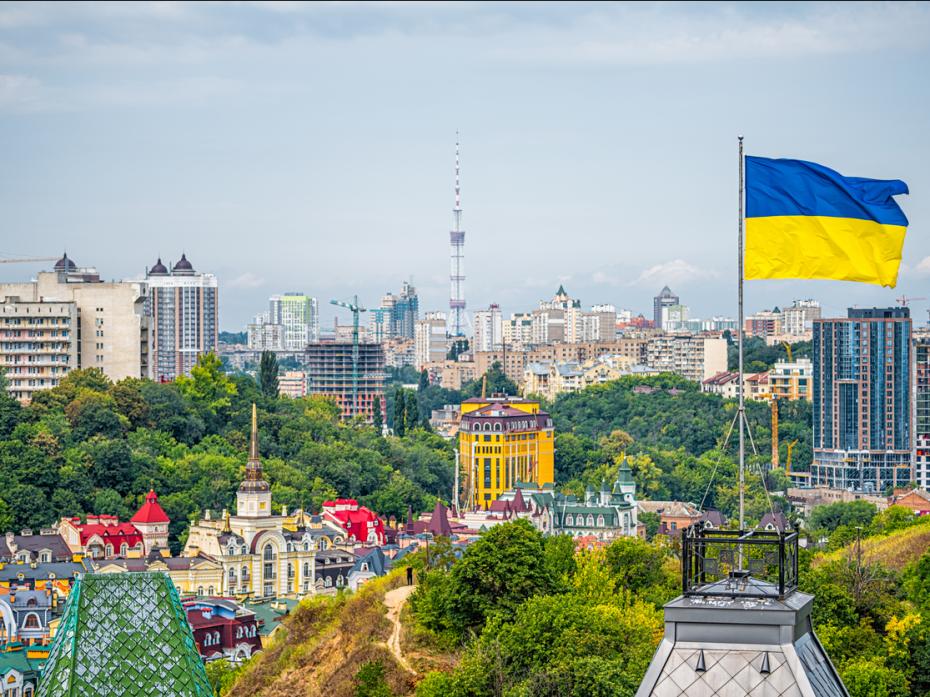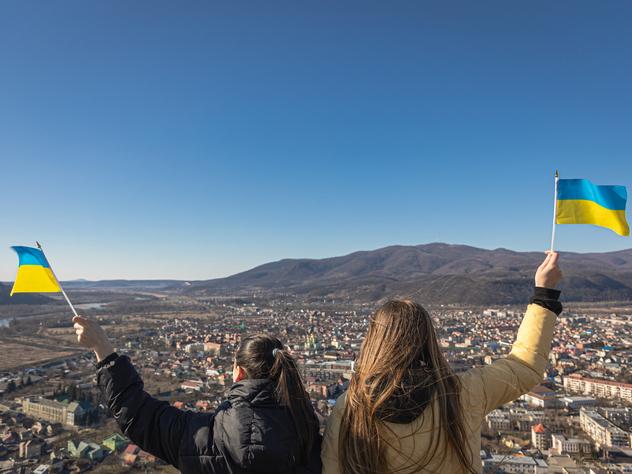
Support for universities during a time of war: working with Ukrainian partners

As an institution, we began working with Ukraine in 2012, and a decade later our European Projects team was leading on three Erasmus-funded projects with Ukrainian partners:
- DESTIN: Journalism education for democracy in Ukraine – a four-year capacity-building project involving 10 Ukrainian universities, a local radio station, the Ukrainian Association of Students and Ukraine’s Ministry of Science and Education
- ACCELERATE: Accessible Immersive Learning for Art and Design – a two-year project involving six partners, including two Ukrainian universities
- A staff mobility project involving two universities in the Ukrainian cities of Sumy and Chernivtsi.
These projects had already been affected by the pandemic, but the impact of the Russian invasion in February 2022 brought immediate, profound and heartbreaking disruption. Colleagues at our Ukrainian partner organisations were forcibly displaced, including two colleagues who had been visiting Bath at the time, who were helped to find safe passage to family elsewhere in Europe. Three partners faced immediate existential threats: Zaporizhzhia National University, Sumy State University and, most tragically, Mariupol State University. Nonetheless, all of these projects were successfully completed during the following year, demonstrating the extraordinary resilience of Ukrainian universities in the face of immense challenges.
- Spotlight guide: THE Awards 2024: learn from the best in UK and Irish higher education
- Practical ways to develop a comprehensive university ‘sanctuary’ programme
- A collective action framework to help Ukraine’s universities survive and rebuild
In the two and a half years since the Russian invasion, Bath Spa University’s European Projects team has continued to provide support and solidarity for our Ukrainian partners. Here is just some of what we have learned in that time:
Managing the funding of projects with Ukrainian partners
- If your funding agreement includes a force majeure clause, be sure to invoke it as early as possible. This clause releases participants from liability if an extraordinary event occurs that is beyond their control, disrupting their work. Some funders may need persuading that it is needed.
- Equipment purchased for a project partner may have been destroyed, moved, repurposed to meet more pressing needs, or put into storage for safekeeping; check if this is the case and document it, as funders may expect reports to include information about use and access of equipment.
- Purchasing equipment locally will be more complex, slower or, at times, impossible; consult with your funder about how this might affect budgeting allocations or project outcomes.
- Payments to partners may take extra time or may be subject to extra due diligence checks; also, national restrictions may limit what incoming funds can be used for. For example, staff costs might be permissible, but other types of spending may not be allowed. Work closely with your own finance departments to find solutions to these challenges such as making multiple attempts, using different banks and ring-fencing grant money locally so that it can be paid at a later date.
Working with Ukrainian partners
- Expressions of solidarity may feel ineffectual given the realities of war on the ground, but they really do mean a lot for partners. Bath Spa University issued a statement of support of Ukraine within hours of the invasion. This was very warmly received by our partners, who continue to mention our support and solidarity as a key element of our relationship.
- Do not make assumptions about what a partner can or cannot do. In the first weeks of the war, it was all too easy to think that Ukraine’s universities were no longer viable, but within weeks they were back teaching, researching and collaborating. Partners will often want to remain engaged in the project not only to demonstrate their resilience but also to retain a sense of “normality”. Go out of your way to enable them to feel as engaged and active as possible.
- Ensure that a partner’s contribution is very clear in all reporting and dissemination because this will help build their reputation as a committed and resilient partner.
- Maintain regular communication with partners so you are aware of changing circumstances and can work on mitigations; this might mean using alternative communication tools such as WhatsApp or Telegram.
- Always allow time to listen to your partner as they explain their situation and what is happening in the conflict.
- Make online meetings longer to accommodate the partner’s need to share updates while still contributing to the project’s aims within the meeting.
- Be aware that power outages and disruptions resulting from attacks will affect the speed of response from partners. Build in longer lead times ahead of important deadlines.
- Be aware, too, that some communication with the partner will be done on a mobile phone with limited network coverage and bandwidth, and they might not be able to open large files or deal easily with complex documents.
- In multi-partner projects, speak directly to non-affected partners so that they are aware of the situation on the ground and that they may be asked to take on extra work to meet the project outcomes.
- You will often feel guilt-stricken when asking for standard reports or official documentation, but the chances are that the partner will want to complete this paperwork as fully and properly as they can to affirm their contribution to the project.
Finally, it is important that you and your team also exercise self-care: working with partners during a war will take an emotional toll on you and your colleagues, especially as your life continues as normal.
Ian Gadd is a professor of English literature and research lead for the School of Writing, Publishing and Humanities at Bath Spa University. He is also academic director of Global Academy of Liberal Arts.
Rachael McDonald is post award and international grants manager in the research support office at Bath Spa University.
Bath Spa University was shortlisted for International Collaboration of the Year at the Times Higher Education Awards 2024 #THEAwards. A full list of shortlisted candidates can be found here.
If you would like advice and insight from academics and university staff delivered direct to your inbox each week, sign up for the Campus newsletter.


